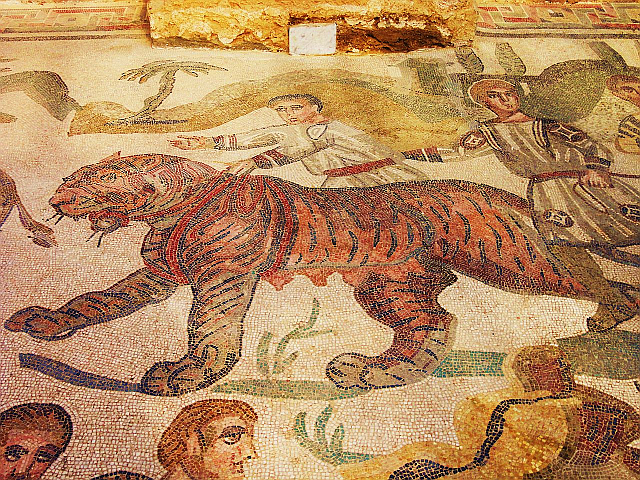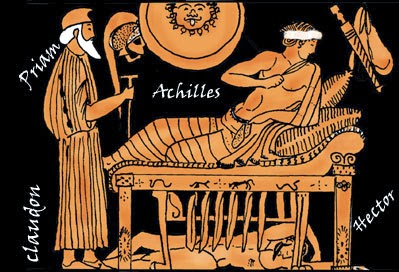Beauty walks a razor’s edge
λόγχαις ἑπτάπυλον στόμα
ἔβα, πρίν ποθ᾽ ἁμετέρων
120αἱμάτων γένυσιν πλησθῆναί τε καὶ στεφάνωμα πύργων
πευκάενθ᾽ Ἥφαιστον ἑλεῖν. τοῖος ἀμφὶ νῶτ᾽ ἐτάθη
125πάταγος Ἄρεος, ἀντιπάλῳ δυσχείρωμα δράκοντος.
[117] He paused above our dwellings; he gaped around our sevenfold portals with spears thirsting for blood; but he left [120] before his jaws were ever glutted with our gore, or before the Fire-god's pine-fed flame had seized our crown of towers. [125] So fierce was the crash of battle swelling about his back, a match too hard to win for the rival of the dragon.
Jebb notes the oddness here, as has been noted here for the second strophe, of a "blurred" transition from figure to proper sense, and calls it "thoroughly Sophoclean":
Seven-gated Thebes
The words φονώσαισιν ἀμφιχανὼν... λόγχαις once more merge the image of the eagle,—as at v. 115,—in literal description of a besieging army, save in so far as the figurative “ἀμφιχανών” suggests a monster opening its jaws. The word was perh. suggested by Il. 23.79 “ἐμὲ μὲνκὴρ ι ἀμφέχανε στυγερή” (hath gaped for me—i.e. ‘devoured me’). These transitions from clear imagery to language in which the figure is blurred by the thought of the object for which it stands, are thoroughly Sophoclean: cp. n. on O. T. 866.Further along in the strophe, many translators choose to not include the names of gods that are in the Greek. Jebb has "Fire-god" -- literally it's "piney Hephaestos." He and others also literalize Ares. Jebb has "clash of battle" where "clash of Ares" (πάταγος Ἄρεος) would seem closer to the text.
Grene drops the divine names for literal reference.
But before his jaws would be satedFitts-Fitzgerald:
with our blood, before the fire,
pine fed, should capture our crown of towers,
he went hence—
such clamor of war stretched behind his back,
from his dragon foe, a thing he could not overcome.
But before his jaws were sated with our blood,
Or pine fire took the garland of our towers,
He was thrown back; and as he turned, great Thebes––
No tender victim for his noisy power––
Rose like a dragon behind him, shouting war.
Curiously, all three keep the figure of the dragon for Thebes, but the effect is different. Fitts-Fitzgerald's dragon is an animated simile and vocal where Jebb's is more like a metonymic mascot name.
We can't ignore the issue of the war "at the back of" the attacking army (or eagle). If the Theban defenders were in the city, how did they (the dragon) rise behind the enemy? Perhaps something (the beam of Helios?) caused the Argives to turn and run, so that the defenders opened the gates and pursued them.*
So, with help from Nicholas P. Gross's commentary and begging the indulgence of the gods and skilled craftsmen of translation:
He stood having gaped around the roofs of the seven-gated mouth [stoma or στόμα is singular - the multiple as one] with bloodthirsting spearheads. Before the jaws could glut our blood or
piney Hephaestos seize our crown of towers, they left [no agency is identified], and the clashing Ares of the dragon stretched round the back of the Eagle, a near-equal hard conquest.
Sophocles uses ἀντιπάλῳ in the final line. Literally the word means "wrestle against," but in use it came to mean a situation in which two are "nearly matched or balanced." It's odd to use it with δυσ-χείρωμα, "hard conquest." In a few lines we have an impending attack, which suddenly ceases, and a counterattack, ending with a conquest in which the two clashing forces were nearly as one. The Argives get rendered visually, the Thebans more aurally.
In this ode rich in language in which, as Jebb notes, "the figure is blurred by the thought of the object for which it stands" so that gaping eagles and clashing Ares are jarred by actual spearheads, it would be interesting to ask our modern translators why they suppress metonymies like Hephaestos and Ares. As we've seen, the language of the ode is destabilizing -- one can't know from moment to moment whether to expect prosaic literal language, strong metaphor, weak metonymy, or a combination of these (as in φονώσαισιν...λόγχαις - "blood-thirsting spearheads").
Given this unstable poetic environment, changing Hephaestos to "fire" and Ares to "war" seems odd. Perhaps where anything goes, one seeks literal language to cling to, shelter from the storm.
*Euripides' Phoenissae offers very much this sort of scenario, except the stampede occurs after the single-handed combat of Eteocles and Polyneices. These two fight and die by each other's hand. The Argives have laid down their arms during the contest, the Thebans have not. Perceiving their advantage, the Thebans pursue and slaughter the Argive army.
*Euripides' Phoenissae offers very much this sort of scenario, except the stampede occurs after the single-handed combat of Eteocles and Polyneices. These two fight and die by each other's hand. The Argives have laid down their arms during the contest, the Thebans have not. Perceiving their advantage, the Thebans pursue and slaughter the Argive army.






